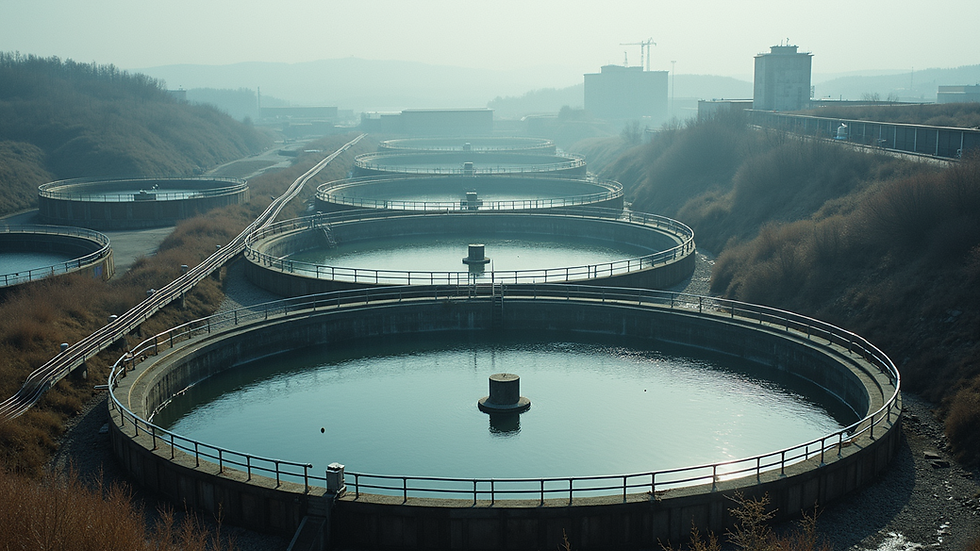Effective Methods for Treating Industrial Wastewater
- palwinder kaur
- Oct 14, 2025
- 4 min read
Industrial wastewater treatment is a critical process for maintaining environmental safety and complying with regulatory standards. Industries generate large volumes of wastewater containing various pollutants that can harm ecosystems and human health if not properly treated. This article explores effective methods for treating industrial wastewater, providing practical insights and actionable recommendations to ensure efficient and sustainable wastewater management.
Understanding the Importance of Treating Industrial Wastewater
Treating industrial wastewater is essential to prevent contamination of natural water bodies and to protect public health. Untreated wastewater can contain hazardous chemicals, heavy metals, and organic pollutants that pose serious risks. Proper treatment not only reduces environmental impact but also helps industries comply with legal requirements and avoid penalties.
Industries such as manufacturing, chemical processing, textiles, and food production produce wastewater with diverse characteristics. Therefore, treatment methods must be tailored to the specific type of wastewater and pollutants involved. Implementing effective treatment solutions can also enable water reuse, reducing overall water consumption and operational costs.

Key Techniques for Treating Industrial Wastewater
Several methods are used to treat industrial wastewater, each targeting different types of contaminants. The choice of treatment depends on the wastewater composition, volume, and discharge standards. Below are some of the most effective techniques:
1. Physical Treatment Methods
Physical treatment involves the removal of suspended solids and large particles through processes such as screening, sedimentation, and flotation. These methods are usually the first step in wastewater treatment.
Screening removes large debris like plastics and rags.
Sedimentation allows heavier particles to settle at the bottom of tanks.
Flotation uses air bubbles to lift lighter particles to the surface for removal.
These processes help reduce the load on subsequent treatment stages and improve overall efficiency.
2. Chemical Treatment Methods
Chemical treatment uses reagents to neutralize or precipitate contaminants. Common chemical processes include coagulation, flocculation, and neutralization.
Coagulation and flocculation involve adding chemicals that cause fine particles to clump together, making them easier to remove.
Neutralization adjusts the pH of wastewater to safe levels, which is crucial for protecting aquatic life and infrastructure.
Chemical treatment is particularly effective for removing heavy metals, oils, and dissolved solids.
3. Biological Treatment Methods
Biological treatment uses microorganisms to break down organic pollutants. This method is widely used due to its cost-effectiveness and environmental friendliness.
Aerobic treatment involves oxygen-loving bacteria that degrade organic matter in the presence of air.
Anaerobic treatment uses bacteria that thrive without oxygen, producing biogas as a byproduct.
Biological processes are suitable for wastewater with high organic content, such as from food processing or paper mills.

What is the meaning of industrial wastewater?
Industrial wastewater refers to the liquid waste generated by industrial activities. It contains a mixture of water and various pollutants, including chemicals, heavy metals, oils, and organic matter. This wastewater differs significantly from domestic sewage due to its complex composition and higher pollutant concentrations.
Industries produce wastewater during manufacturing, cleaning, cooling, and other processes. If discharged untreated, it can cause severe environmental damage, including water pollution, soil contamination, and harm to aquatic life. Therefore, understanding the nature of industrial wastewater is crucial for designing effective treatment systems.
Advanced Technologies in Treating Industrial Wastewater
With increasing environmental regulations and the need for sustainable practices, advanced technologies have emerged to enhance wastewater treatment efficiency.
Membrane Filtration
Membrane technologies such as ultrafiltration, nanofiltration, and reverse osmosis provide high-quality water by removing dissolved solids, bacteria, and viruses. These methods are highly effective but require significant energy and maintenance.
Advanced Oxidation Processes (AOPs)
AOPs use powerful oxidants like ozone, hydrogen peroxide, or UV light to break down complex organic pollutants into harmless substances. This method is particularly useful for treating toxic and non-biodegradable compounds.
Electrochemical Treatment
Electrochemical methods apply electrical currents to remove contaminants through oxidation or reduction reactions. This technology is gaining popularity for its precision and ability to treat a wide range of pollutants.

Best Practices for Implementing Industrial Wastewater Treatment
To maximize the effectiveness of wastewater treatment, industries should follow these best practices:
Conduct thorough wastewater characterization to identify pollutants and select appropriate treatment methods.
Implement a multi-stage treatment approach combining physical, chemical, and biological processes.
Regularly monitor treatment performance to ensure compliance with discharge standards.
Invest in staff training to maintain and operate treatment systems efficiently.
Explore water reuse opportunities to reduce freshwater consumption and operational costs.
Stay updated with regulatory changes and adopt new technologies as needed.
By adopting these practices, industries can achieve sustainable wastewater management and contribute to environmental protection.
Moving Forward with Sustainable Wastewater Management
Effective treatment of industrial wastewater is vital for safeguarding water resources and supporting sustainable industrial growth. By understanding the characteristics of wastewater and applying appropriate treatment methods, industries can minimize their environmental footprint and comply with regulations.
Continuous innovation and adherence to best practices will ensure that wastewater treatment systems remain efficient and adaptable to changing needs. Embracing advanced technologies and promoting water reuse can further enhance sustainability efforts.
Investing in robust wastewater treatment not only protects the environment but also improves operational efficiency and corporate responsibility, paving the way for a cleaner and healthier future.



Comments